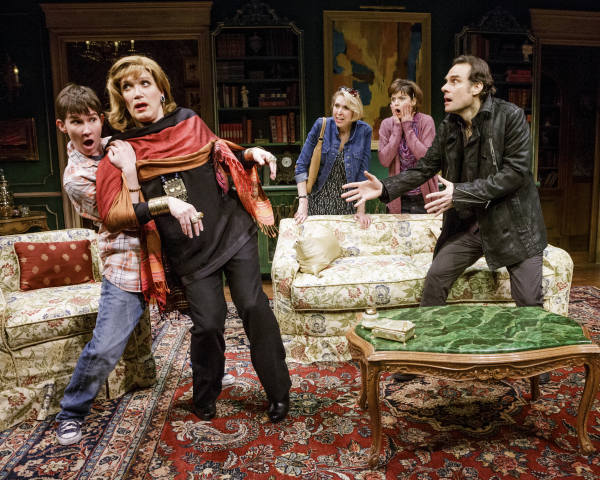The Tribute Artist

(© James Leynse)
In the world of New York real estate, all's fair in love and falsies. I suppose that's the throughline that has connected all of Charles Busch's work as a playwright and drag— excuse me… "tribute artist." He comes to 59E59 Theaters with a new play, fittingly titled The Tribute Artist — a project that strays from his typical pop-culture sendups like Psycho Beach Party and the long-running off-off-Broadway hit Vampire Lesbians of Sodom in which his loyal followers have seen him take on a slew of leading lady roles. Teased wigs, flamboyant costumes, and Katharine Hepburn impersonations remain, but this time he straddles the competing realms of farce and reality, resulting in a hit-and-miss evening of comedy.
In a rare turn of events, Busch takes on the role of a man named Jimmy, a washed-up Vegas "tribute artist" (not "drag queen," he insists) who has come to the unhappy realization that Bette Davis is out and Rihanna is in. Jimmy takes an extended soul-searching trip to New York City where he rents a room in a luxurious Village town house (elaborately designed by Anna Louizos) from a wealthy and shamelessly self-absorbed widow named Adriana (the icy Cynthia Harris). Jimmy's best friend Rita, a strapped and notoriously untalented lesbian real-estate broker (Julie Halston) makes frequent visits to the Victorian mansion, as well, where she and Jimmy entertain themselves by parading around in gaudy gowns (designed by Gregory Gale), direct from his Vegas trunk.
When Adriana spontaneously dies in her sleep before she is able to name an heir to her $12 million estate, Jimmy and Rita devise a plan to get out of the financial gutter. Using Rita's expert brokering and Jimmy's talent for female impersonations, they decide to keep Adriana's death a secret until they are able to sell the town house then split the money fifty-fifty.
Foolproof, right?
Think again. Hijinks ensue when Adriana's embittered niece Christina (Mary Bacon) and her transgender teenage son who recently changed his name from Rachel to Oliver (Keira Keeley) come to town looking to claim the house for themselves. In short order, an appearance by one of Adriana's ex-lovers, Rodney (Jonathan Walker), adds another fly to the despicable ointment.
Though the farfetched plot may imply otherwise, The Tribute Artist is set in a far more grounded world than the majority of Busch's earlier works. This naturalistic setting establishes an expectation of authenticity that is never quite satisfied among the farcical plot twists and exaggerated sexual humor for which Busch is more traditionally known. Under the direction of Carl Andress, many of Busch’s jokes land big laughs — particularly when Jimmy slips into his Vegas act, repurposing iconic film speeches delivered by old Hollywood dames. Yet, rather than building a cohesive ensemble, Andress and Busch seem to have crafted a series of individual standup acts with Busch as the headlining performer. Halston, in her usual brassy style, revitalizes the audience with her own long-winded speech, which proves one of the play’s most crowd-pleasing moments. Unfortunately, the hope of potentially unearthing another of these entertaining asides is the only thing maintaining our stamina through the rest of Busch's twisted plot, filled with mostly unlikeable characters.
Even during more traditional scenes, the actors speed through dialogue, playing more for laughs than for its character- and relationship-building functions, which in turn diminishes its comedic effect. Keeley's transgender character in particular is molded into a distracting caricature with exaggerated affectations as both a dim-witted teenager and a want-to-be stereotypical male who walks the halls doing voice-lowering exercises and practicing his pimp limp. Of the whole company, Walker strikes the greatest balance as the conniving, sexually charged Rodney, maintaining an authentic center in midst of the absurdity.
As circumstances spin out of control and characters reveal their ugliest sides, it becomes increasingly difficult to champion any of their causes in this rat race for undeserved wealth. The current state of the economy may soften some to the economic woes of Busch's down-and-out characters, but as far as I can tell, none of them have even tried checking Craigslist for an affordable one-bedroom in Queens.










